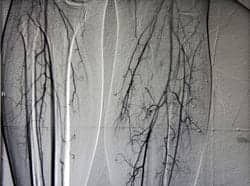A type of cell in the brain blood vessels could explain the origins and dynamics of amyotrophic lateral sclerosis (ALS), according to a study, the results of which suggest a hitherto unknown connection between the nervous and vascular systems.
The study, published in Nature Medicine, may have potential implications for earlier diagnoses and future treatments of ALS, a neurodegenerative disease of the motor neurons that eventually causes muscular atrophy, paralysis and death.
The cause of ALS is only understood in patients who have an inherited form of the disease. To help in its early detection and to develop efficacious therapies, researchers are avidly seeking a clearer picture of the disease’s pathogenesis.
ALS patients demonstrate high variability of age at onset, non-motor symptoms and survival. In recent years, research has shifted focus from neurological explanations to these differences, and has taken an interest, for example, in the cerebral vascular system, which delivers oxygen and nutrients to brain tissue.
Researchers at Karolinska Institutet, KTH Royal Institute of Technology, SciLifeLab, London’s Imperial College and Umeå University have now studied whether a possible connection exists between perivascular fibroblast cells and the time of disease onset and survival, a media release from Karolinska Institutet explains.
Genes Active During Asymptomatic Period
Studies on mice with ALS showed that genes for perivascular fibroblasts were active already in an early asymptomatic stage of the disease and months before neuronal damage began to appear.
The researchers then examined the levels of a large number of potential marker proteins in the plasma of 574 patients with a recent ALS diagnosis and 504 healthy controls from four countries.
Their results suggest a correlation between elevated levels of the protein marker SPP1 for perivascular fibroblasts and an aggressive disease process and shorter survival.
“It is exciting to see how the results from our protein profiling could be connected to the long range of cellular and molecular analysis that we have done and reveal the identified association to disease progression.”
— first author Anna Månberg, researcher at the Department of Protein Science, at KTH and SciLifeLab
“Our results indicate that vascular events are a factor in the disease’s heterogeneity and can improve our knowledge of early-stage ALS. More studies are now needed on vascular disease mechanisms for better prognostic tools and future treatments.”
— the study’s last and senior author Sebastian Lewandowski, researcher at the Department of Clinical Neuroscience and the Centre for Molecular Medicine at Karolinska Institutet
[Source(s): Karolinska Institutet, EurekAlert]
Related Content:
ALS Symptoms’ Impact on ADLs
Scientists ID Compound They Hope Could Reverse ALS Damage
This Could Help ALS Neurons Mellow Out





